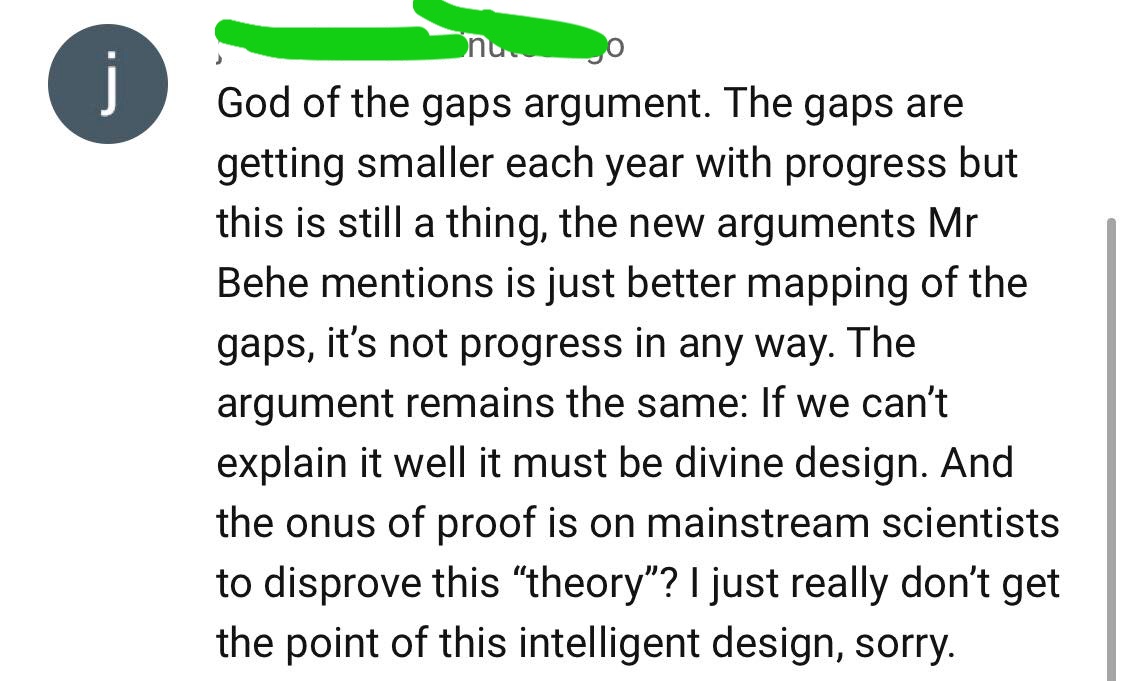
The following was posted in response to my recent podcast with Dr. Michael Behe.

In other words, now would be a worthwhile time to write a brief post on what the god of the gaps fallacy is and why this (generally) low IQ retort is nowhere near as threatening as Youtube atheists assume it is.
Typically, a god of the gaps fallacy would fall under the informal fallacy of argument from ignorance, in which a person presented with a mystery posits an unevidenced, superstitious, and/or corresponding (but not necessarily causal) explanation, claiming that because it has not been disproven, it must be true.
For example, if one does not know why the Yankees won, they attribute their favorite baseball team’s victory to their pair of lucky socks. That would be an argument from ignorance, and one predicated upon superstition. Specifically, regarding god of the gaps, perhaps somebody does not know how lightning occurs, so they purport Zeus sent it, and since nobody has proven otherwise, there you go. I’m sure you could think of your own examples.
Before we get to Behe, however, let’s begin by analyzing a philosophical argument for God which itself has frequently been accused of god of the gaps reasoning.
If the universe began to exist, the universe has a cause.
The universe began to exist.
So, the universe has a cause.
Anybody who’s taken a semester in logic will understand this to be a valid modus ponens syllogism where the conclusion follows inescapably from the premises (assuming they’re true). So, it can’t be an argument from ignorance in that sense, since if – if, if, if! – the premises are true, the conclusion is entailed. As for the premises themselves, the first involves a primarily metaphysical analysis of causation and is supported by numerous independent considerations (including the bedrock assumption that “out of nothing, nothing comes”), whereas premise two enjoys both philosophical support and scientific evidence. In other words, both premises are bolstered precisely by what we do know (knowledge) not what we do not (ignorance). So, it is really just a completely jackass thing to call The Kalam Argument an argument from ignorance. And one of it’s most prominent defenders, Dr. Bill Craig, does a great job explaining why that is, here.
FWIW, other philosophical arguments for God, such as the one I present in How to Think About God, are even less susceptible to the charge of god of the gaps reasoning because they proceed by way of strict metaphysical demonstration, where each premise in a deductive chain can be avoided only on pain of contradiction and/or absurdity.
OK, back to Behe, then. Here is my response to the fellow above, posted on Youtube.
I don’t think you understand what a god of the gaps (argument form ignorance) fallacy is. Behe’s isn’t that, because 1) Behe’s is an argument from the best of our contemporary empirical knowledge regarding the limits of Darwin’s mechanism – evidence (not ignorance!) which counts against particular aspects of modern evolutionary theory – and 2) Behe doesn’t infer God, only intelligence via abductive reasoning, which is perfectly legitimate, as we’ve pointed out in numerous conversations. While I get “god of the gaps” is a convenient cliché to offer in response to ID, it’s a boring, mildewed, and irrelevant criticism which betrays both philosophical and scientific ignorance.
Everything else in his comment amounts to nothing more than bare assertion, and (as they say) whatever is presented without evidence can be dismissed without evidence. So there you go.
Related Resources/Episodes
The 5 Ways of Thomas Aquinas with Dr. Gaven Kerr
Cross-Examining Intelligent Design with Dr. Michael Behe